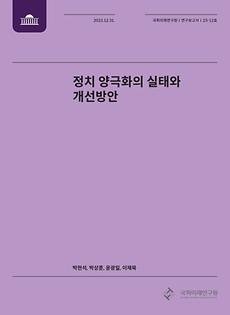
Polarization stands out as a major contributor to political gridlock in Korea. This study analyzes the current state of political polarization in Korea and proposes solutions to mitigate its adverse effects.To this end, surveys and a survey experiment involving the general electorate were conducted, while legislative staff in the National Assembly were polled.
The survey of the general electorate revealed some evidence of political polarization among voters, but the level appears to be moderate. Meanwhile, the survey experiment was aimed at gauging voters' affinity toward political candidates from the two major parties while controlling for the degree of policy polarization and the provision of party information. The results indicate that the policy polarization of politicians and the availability of party information do not significantly impact voters' affinity for specific candidates. No evidence was found that party polarization is mobilizing affective polarization among the general electorate. However, nearly half of the legislative staff members surveyed believe that party polarization reflects the polarization of the electorate.
These seemingly contradictory results can be explained by the polarization of party activists, who are overrepresented within political parties. Therefore, addressing the issue of political polarization requires balancing the voices of polarized party activists with the preferences of general party supporters and voters within each party. In contrast to previous studies suggesting reforms to the presidency or electoral laws, we propose focusing on political party reforms, such as the nomination process and membership structure, to promote pluralism within the political parties.